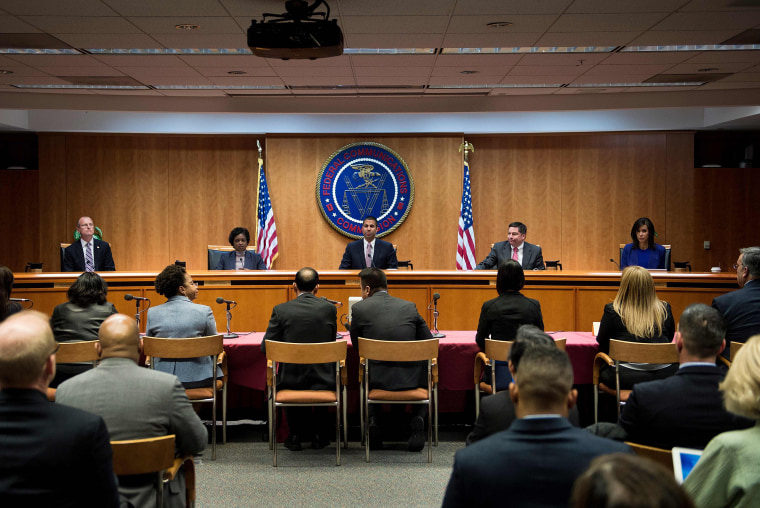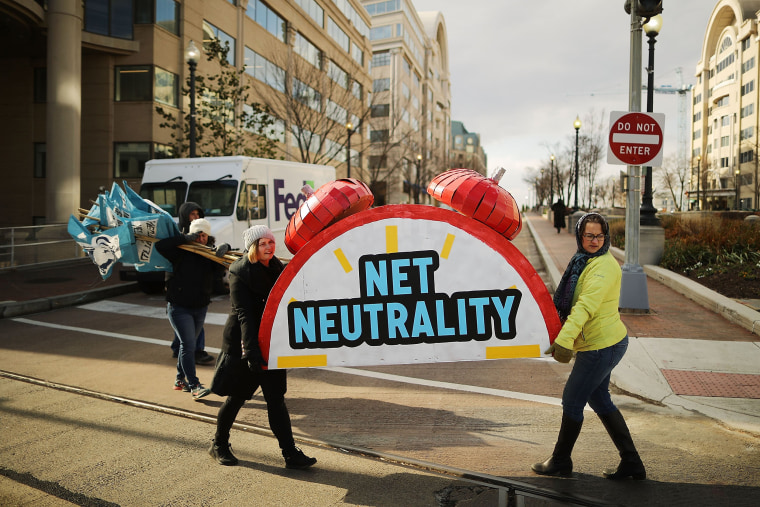The Federal Communications Commission (FCC) on Thursday voted along party lines to scrap Obama-era net neutrality regulations, which since 2015 required internet service providers to treat all web traffic as equal. While the move was applauded by internet service providers, including NBC News’ parent company Comcast-NBCUniversal, it was slammed by big tech companies, consumer advocacy groups and a number of LGBTQ organizations.
“Stripping away net neutrality is the latest attempt by the Trump Administration to silence voices of already marginalized communities and render us invisible,” Sarah Kate Ellis, president and CEO of of LGBTQ media advocacy group GLAAD, said in a statement. “The internet is a lifeline for LGBTQ people to build community support networks and access LGBTQ resources on history, suicide prevention, and health.”
Ellis added that “allowing broadband providers to regulate access is a direct and unconscionable attack on freedom of expression.”

FCC Chairman Ajit Pai, a Trump appointee who, along with the two other Republicans on the commission, voted in favor of the decision to do away with net neutrality regulations, said the FCC is “restoring the light touch framework that has governed the internet for most of its existence.”
“Americans will still be able to access the websites they want to visit. They will still be able to enjoy the services they want to enjoy. There will still be cops on the beat guarding a free and open Internet. This is the way things were prior to 2015, and this is the way they will be once again,” Pai said after the net neutrality vote.
A ‘DEVASTATING IMPACT’?
Jessie Daniels, a sociology professor at Hunter College in New York City, said the FCC’s move will disproportionately affect marginalized communities.
“For LGBTQ people who want access to the internet and want connection, I think it’s going to have a devastating impact,” she said.
Net neutrality, Daniels explained, is “saying that internet providers cannot distinguish between types of sites — they have to be neutral about the access we have to the internet, and they can’t make a distinction that costs different amounts of money for different content.”
Daniels said she does not buy the rationale Pai offered for the regulatory rollback.
“Pai keeps parroting this conservative free market take on the internet — that it’s not going to hurt consumers, that consumers are going to benefit because there is going to be competition in the marketplace, that that will keep prices down and improve services,” Daniels said. “It just doesn’t work that way. In the last 25 years, it’s become a utility — a thing that people rely on. I think it should be regarded as a utility and not a luxury consumer item.”
David Cohen, Comcast Corporation’s senior vice president and chief diversity officer, pushed back against the criticism and fears surrounding the net neutrality rollback, saying in a statement that it “does not mark the ‘end of the internet as we know it.’” Echoing Pai, Cohen said the move “heralds in a new era of light regulation that will benefit consumers.”
INFORMATION HIERARCHY
F. Hollis Griffin, author of “Feeling Normal: Sexuality and Media Criticism in the Digital Age,” said the LGBTQ community has uniquely benefited from the internet’s open access.
“Inside the relative democracy of the internet, LGBTQ communities found places to thrive because of the open access of it. One could find content quickly and easily, and it wasn’t the same kind of hierarchical organization as television or traditional media,” he said.
“If you go on Google and type in ‘gay media,’ you get 100,000 hits and everything from NBC to a blog hosted by a user. You get all different kinds of content, and most of it is accessible,” Griffin added. He speculated with net neutrality rules scrapped, there “will be far fewer hits” and “most of it behind paywalls.”
“What this does is recreate a hierarchy that inhibits people’s access to information, and for communities like sexual minorities that is really important,” he said. “Think about rural spaces, where it is hard to find people like yourself. The internet facilitates connecting people in ways that weren’t possible before. That’s going to be harder to do.”
Griffin also speculated the FCC’s decision to deregulate internet service provides would impact the ability of activists to organize.
“The internet has come to be a hub for activist activity. Not just for internet activism but connecting people on the ground, connecting people to information on protest,” he said, adding that if an internet service provider disagrees with particular activist activity, it could potentially slow or block that content.
Many internet service providers, including Comcast and AT&T, have said they will not block, throttle or engage in paid prioritization. However, with the latest FCC action, there's nothing actually preventing them from engaging in those practices, as long as they disclose them.
‘MATTER OF LIFE AND DEATH’ FOR LGBTQ YOUTH
Eliza Byard, executive director of LGBTQ youth advocacy group GLSEN, said the net neutrality repeal could be “literally a matter of life and death” for LGBTQ youth.
LGBTQ youth, according to a 2013 GLSEN report, are almost twice as likely as their heterosexual and cisgender peers to have searched for health and medical information online, and they are also “four times as likely to have searched for information on HIV/AIDS and other STIs.” What may contribute to their disproportionate reliance on the internet for health-related information is the lack of LGBTQ-inclusive sexual education in the U.S. and abroad.
LGBTQ youth are also more likely to be isolated and look to the web to build their social networks, according to GLSEN’s report, which found more than half of LGBTQ youth who were not out to peers in person had used the internet to connect with other LGBTQ people.
“The idea that the free market is going to come out with equitable or reasonable outcomes is too dangerous an assumption when you are talking about LGBTQ youth,” Byard told NBC News.
WHAT’S NEXT?
While the ramifications of Thursday's decision won't be immediately felt, FCC Commissioner Jessica Rosenworcel, who voted against gutting net neutrality, warned there could be long-term consequences.
"What this proposal would do is it would give broadband providers the legal right and the power to start blocking websites, or censoring content if they don't have a commercial relationship with that content. And so the open internet as we know it could change," she told NBC News after the vote. "Perhaps not immediately, but over time. And I think that's troubling."
While a number of critics, like Rosenworcel, are focusing on the long-term impact of the rollback, the attorneys general of New York and Washington state have already announced they plan to sue.
However, as previously reported by NBC News, Congressional action may be the only thing that stops a political back-and-forth over net neutrality whenever a new political party comes to power.
"This isn’t over and done with," Roslyn Layton, a visiting scholar at the American Enterprise Institute, said. "There is no doubt if the Democrats took the presidency, they would try to go back to where things were in 2015."


